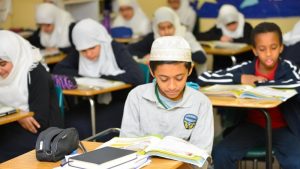
Maryland Educators To Survey Muslim Experiences With Education
New Survey to Analyze Muslim Educational Experiences
 The past generation has seen unprecedented levels of often hostile scrutiny on Muslims in the United States, largely linked both to the United States’ entanglement in Muslim countries and a thriving Islamophobia industry that has sought to misinform the public on Islam.
The past generation has seen unprecedented levels of often hostile scrutiny on Muslims in the United States, largely linked both to the United States’ entanglement in Muslim countries and a thriving Islamophobia industry that has sought to misinform the public on Islam.
The experiences of Muslim students, families, and teachers in the education system are the focus of a survey by the American Muslim Empowered Education Network, pithily abbreviated AMEEN, which hopes to analyze and address these issues.
AMEEN
AMEEN was founded by experienced teacher and educational administrator Farhana Shah, whose work over twenty years has especially focused on correcting American misunderstandings of Islam. She has designed courses to brief educators on the background, history, and role of Islam and Muslims in order to enable them to engage their Muslim students and communities in a more empathetic and productive manner. In addition she has presented on Muslim culture at the Smithsonian Institute and Library of Congress.
Three Surveys:
Keep supporting MuslimMatters for the sake of Allah
Alhamdulillah, we’re at over 850 supporters. Help us get to 900 supporters this month. All it takes is a small gift from a reader like you to keep us going, for just $2 / month.
The Prophet (SAW) has taught us the best of deeds are those that done consistently, even if they are small.
Click here to support MuslimMatters with a monthly donation of $2 per month. Set it and collect blessings from Allah (swt) for the khayr you’re supporting without thinking about it.
In order to better understand and address the experiences in education, and address the concerns of the Muslim community, AMEEN has prepared three anonymous surveys in which American Muslims are requested to participate: one for students, one for their families, and one for their educators.
“In order to elevate our community’s concerns,” the organization says, “it is crucial that we have an accurate assessment of what our children are experiencing. We appreciate your participation in this important effort as it requires a village to raise confident, self-assured, and secure children.”
The surveys can be found below:
1. Muslim Student Survey (for students in grades 4-12)
2. Muslim Parent/Guardian/Caregiver Voice Survey (For parents of students in grades pre-K – 12)
3. Muslim Teacher and School Staff Survey
Related:
[Podcast] Public School, Islamic School, Or Homeschool Education? | Omar Abdul Fatah



